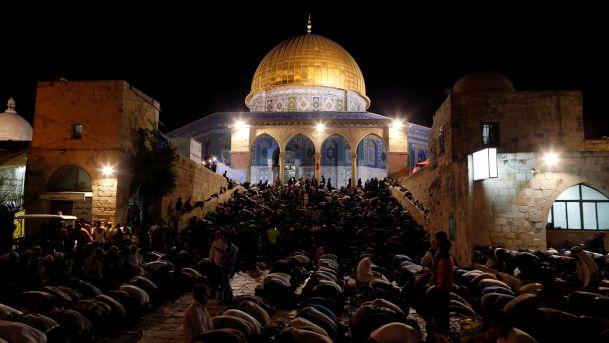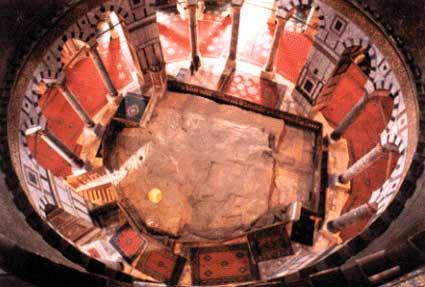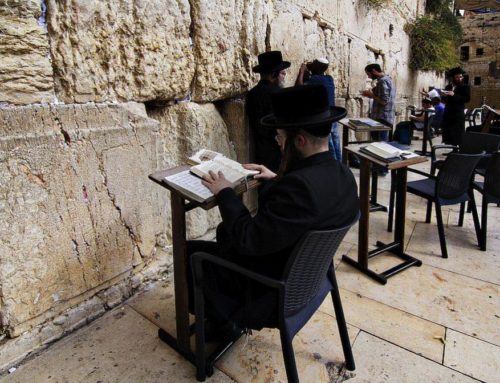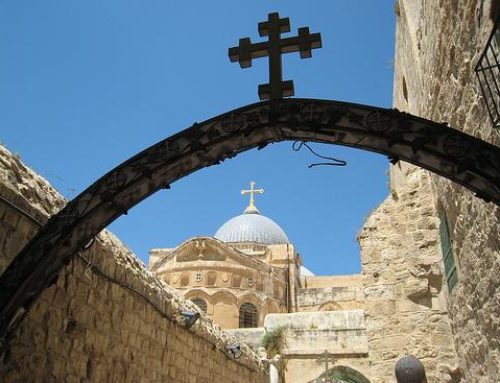
Jerusalem in Quran: the Blessed City
In the chapter titled Al-Isra, the Quran recalls the night journey of Prophet Muhammad , to Jerusalem from Makkah and his ascension to heaven. [4] Muslim scholars argue that the trip to Jerusalem was important for multiple reasons–but no doubt the divine decision to send Muhammad there before allowing him to ascend to the heavens, and Muhammad’s leadership of the resurrected prophets and messengers in prayer[5] made clear the centrality of the city and its historical religious value.[6] The Quran mentions Jerusalem at various other points as well–particularly when recounting the story of Mary and Jesus.

Jerusalem in the Sayings and Traditions of Prophet Muhammad
Prophet Muhammad spoke about Jerusalem’s importance as well the duty of Muslims to protect it, but he also told his followers that Jerusalem was going to be the site that marks the end of the war between truth and falsehood.[8]
According to Muhammad, Jerusalem will be the last place on earth where humans are gathered for reckoning and from where they will be raised to the sky for the Day of Judgement. [9]

After the death of Muhammad, the first Caliph, Abu Bakr began preparing for the conquest of Jerusalem. Omar bin Al-Khattab, who became the Caliph shortly after, conquered the city and accepted the surrender of the Patriarch Sophronius along with the keys to the city. [10] The caliphs who came after Omar took care to spend wealth on the construction of landmarks and restoration within the city.[11].
The city gained further importance for Muslims as generations of companions of the Prophet and their descendents, scholars, saints, and righteous caliphs spent time in the city, died and were buried there..[12] In fact, many Caliphs chose Jerusalem as the site where they would be inaugurated, and some, like the Umayyad Caliph Sulayman bin Abd Al-Malik considered transferring the capital of the Islamic dynasty from Damascus to Jerusalem.[13]
Until the Israeli occupation of the city, many muslim caravans on their way to Hajj, encouraged by a statement of the prophet Muhammad, would visit Jerusalem and pray in the Al-Aqsa mosque on their way to Makkah.
[1] Isaac Husseini, The City of Jerusalem: Its Arabism and Status in Islam (Syria and Lebanon: Dar Al-Qalam and Dar Al-Shameiah, 2000), 100 and Hassan Mustafa Khater, Al-Quds: the Educational Pictorial Atlas (Jordan: International Jerusalem Center for Media, International Studies and Documentation, 2013), 72
[2] Husseini, Jerusalem Arabism and Status in Islam, 101
[3] Hassan Jaber, “Jerusalem: Methodology of enrollment and integration,” Jerusalem: Location and History (2000), 11 and Khater, Al-Quds, 75
[4] Surah al Isra 17:1
[5] Khater, Al-Quds, 74
[6] Husseini, Jerusalem Arabism and Status in Islam, 101 and Zaid Al-Hamad, The original entrances to the culture of Jerusalem (Lebanon: Arab Institute for Studies and Publishing, 2012), 31-32
[7] Husseini, Jerusalem Arabism and Status in Islam, 101
[8] Khater, Al-Quds, 76
[9] Khater, Al-Quds, 76
[10] Khater, Al-Quds, 77
[11]Husseini, Jerusalem Arabism and Status in Islam, 102
[12] Husseini, Jerusalem Arabism and Status in Islam, 105 such as Obadah Bin Al-Samet, Shaddad Bin Aos, and Rabia Al-Adaweiah and Khater, Al-Quds, 79
[13] Khater, Al-Quds, 78



